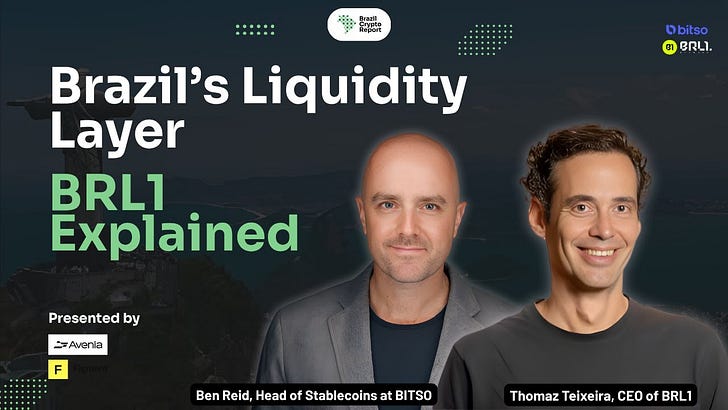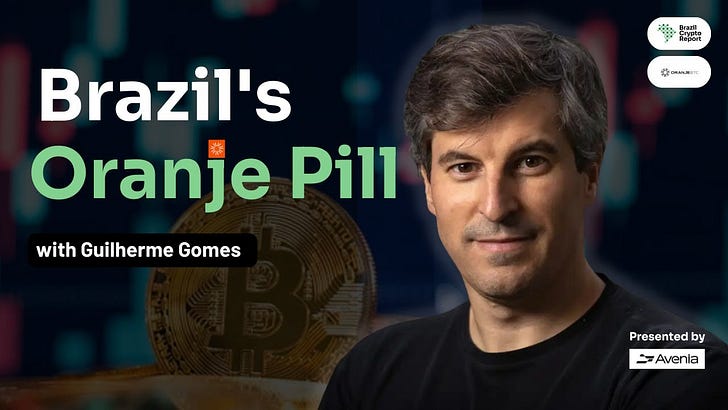APOLOGIES as the original version of this email had an incomplete audio file for some reason. Resending with the FULL VERSION OF THE AUDIO FROM OUR X SPACE
Olá pessoal!
In an X Space discussion hosted last Friday, BCR convened a panel of experts from Brazil's crypto ecosystem to analyze the Central Bank's proposed stablecoin regulations.
The conversation revealed deep concerns about rules that could significantly impact Brazil's position in the global digital assets landscape.
Brazil's Central Bank has proposed several stringent regulations on stablecoin usage, including restrictions on sending stablecoins to non-Brazilian wallets and a ban on transferring stablecoins from regulated exchanges to self-custody wallets.
These rules would make operating far more difficult for exchanges, businesses, and individuals using stablecoins in Brazil.
🎧 You can find Brazil Crypto Report content wherever you listen to podcasts: Spotify | Apple Podcasts | Amazon | Anchor | YouTube
Key Concerns Highlighted by Industry Leaders:
Thiago Sarandy from Binance explained that the proposed ban on self-custody stablecoins prevents Brazilians from accessing decentralized markets and potentially violates constitutional rights to control one's assets.
As an alternative, he called for authorities to implement a reporting system, in partnership with exchanges and blockchain analytics firms, for identifying and tracking wallet addresses and transfers suspected of illegal activity.
Julia Rosin of Bitso noted that these limitations would shrink the market in Brazil and slow down transactions through verification processes that aren't yet reliable enough.
Guilherme Sacamone from OKX pointed out that the rules would create "a clear disadvantage for any player trying to establish itself as a regulated entity in Brazil," potentially driving companies to serve Brazilians from offshore entities instead.
Carlos Russo, CEO of BlueGreen, emphasized that these restrictions would disproportionately impact payment companies rather than exchanges:
"The Central Bank is treating virtual asset service providers as babies in the market, imposing very strict limits... This is very unfair to the payments companies dealing with international payments or international transactions with stablecoins."
Guillerme Rebane of Nanco highlighted that regulators are attempting to apply rules based on an outdated understanding of the stablecoin ecosystem:
"What the Central Bank did is based on their perception of the stablecoin market back two years ago... The PSP industry, payment industry, and also everything and all the ecosystem around stablecoin has evolved rapidly in the last few years."
Cesar Carvalho of Batista Luz Advogados and ABToken shared insight into the regulator’s motives for proposing these restrictive rules:
"Understanding the purpose is crucial to propose the solutions... the central bank priority is security and traceability. And why the ban? Because they understood at the beginning that these sort of transactions involving self-custody wallets are not traceable."
Looking Forward:
Despite the concerns, panelists acknowledged the Central Bank's difficult position and praised its overall approach to crypto regulation. Sarandy noted that "the Brazilian Central Bank is doing a real good job" with much of its regulatory framework, particularly with regards to Public Consultation 109 which allows local service providers to leverage services from abroad.
Carlos from Bluegreen expressed hope that the Central Bank is listening to market feedback:
"I believe the central bank came up with a very harsh proposal in the beginning... because they really wanted to hear from the market. I understand that as of now, they are basically getting all the feedback they wanted."
The stakes couldn't be higher. Brazil has an opportunity to set a global precedent for stablecoin regulation, but panelists warn that overly restrictive rules could drive innovation offshore while failing to achieve regulatory objectives.
As Brazil's Central Bank finalizes these regulations in the second half of 2025, the crypto community is watching closely to see if they'll strike the right balance between preserving financial integrity and fostering innovation in this rapidly evolving space.
-AWS











